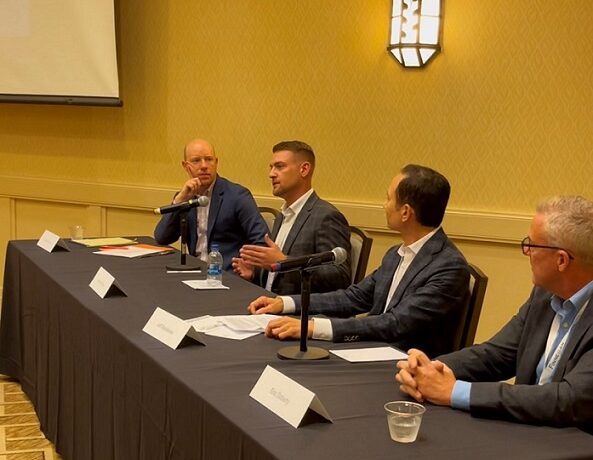Last week, at the annual Southeast Life Sciences Conference, organizations like SCBIO, Bio Alabama, Georgia Bio, Life Science Tennessee, NC Bio, and Virginia Bio all gathered with top life sciences companies to network and discuss ways to advance healthcare. Austin Shirley, VP of Commercial Operations at Diversified Medical Healthcare (DMH), and team were at the conference representing all the DMH brands including Premier Medical Laboratory Services (PMLS), CPT, OnGen, and Vessel Medical. During the conference, Austin joined Eric Doherty, President of Blink Science, and Joff Masukawa, President of Diligentia Strategy, for a panel discussion titled “Diagnostics: Moving to the Forefront of Global Healthcare.”
The panel kicked off with the impact of the COVID-19 pandemic on the rapidly evolving diagnostics industry. In 2020, labs and healthcare facilities quickly had to shift gears as the virus spread around the U.S. The pandemic disrupted and even destabilized the industry as a whole, creating obstacles to overcome for labs like PMLS and its sister companies. Although these challenges were presented, they had a profound impact on the life sciences industry and even forced many companies in the life sciences to expand their offerings. As a result, in many ways, companies in life sciences improved and/or changed a lot of their protocols and processes for a more efficient infrastructure.
As an example, Diversified Medical companies were positioned to meet infrastructure restrictions head-on with a facility already FDA registered and already conducting molecular testing. “We started to notice on the lab side that the supply chain for specimen collection kits and viral transport media was one of the biggest issues,” said Austin Shirley. “So, we began manufacturing these through our company, CPT Medical. We were able to supply our lab with specimen collection kits and keep testing without any hiccups from the supply chain. We also sold these kits to other labs and still are. I think last week we passed a milestone of 2 million specimen collection kits manufactured from a company (CPT Medical) that, a year and a half ago, wasn’t in the business of that.”
Overall, the pandemic put a spotlight on the diagnostics industry and its role in the global healthcare ecosystem, but what about its future? In the panel discussion, Austin delved into rapid point of care testing and how personalized care will affect the future of diagnostics. “Diagnostics could play a role, really in preventative health and how we integrate biometric data from rapid point of care tests into a patient’s polygenic risk score.” He continued to discuss the sensitivity and specificity of point of care assays and how, as we move forward with the accumulation of more data, we will improve the accuracy of point of care testing to make diagnostic testing faster for better patient outcomes. He also explored how, with the help of artificial intelligence, personalized care can be used more to prevent disease rather than just to diagnose currently existing diseases within patients.
The SE Life Sciences conference and the discussion panel itself were an impactful platform to discuss our plans to move healthcare forward and how we can work with like-minded companies, Blink Science and Diligentia Strategy, to make healthcare more efficient and effective for advanced and more individualized patient care.



